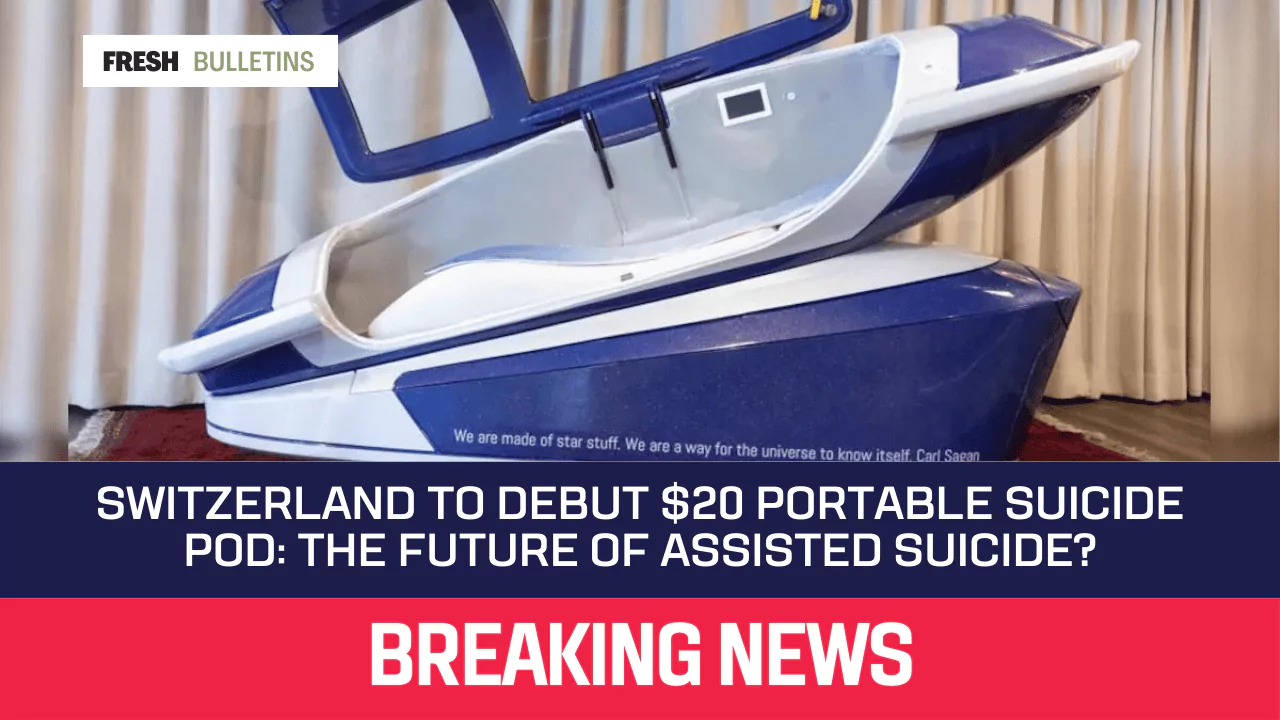Switzerland to Debut $20 Portable Suicide Pod: The Future of Assisted Suicide?
Talking about the end of life is tough. Many people face hard choices when dealing with serious illness or suffering. But what if there was a way to help them choose how to say goodbye on their own terms? That’s where Switzerland steps in with something new and quite controversial – a portable suicide pod, known as the Sarco capsule.
This capsule, developed by Dr. Philip Nitschke and called the “Tesla of Euthanasia,” is making headlines for its unique approach to voluntary assisted dying. For just 20 dollars, it offers a peaceful passing without needing doctors around.
The Development of the Suicide Pod
Dr. Philip Nitschke invented the Suicide Pod, which is portable and 3D-printed, earning it the nickname ‘Tesla of Euthanasia.’.
Invented by Dr. Philip Nitschke
Philip Nitschke, the founder of Exit International, created the Sarco suicide pod. His invention has sparked interest and debate worldwide. Nitschke’s creation is a portable machine that is 3D-printed.
This technology marks a significant step in the discussion about assisted suicide and end-of-life decisions.
The Sarco pod allows for a peaceful passing without medical supervision.
This device represents a new chapter in how societies view death and dying rights. Dubbed the ‘Tesla of euthanasia,’ it highlights advancements in technology’s role in personal choice at life’s end.
The development and discussion of this pod lead us into debates on legality, ethics, and future uses.
Dubbed the ‘Tesla of Euthanasia’
People call the Sarco device the ‘Tesla of Euthanasia’ because it changes how we think about assisted suicide. Dr. Philip Nitschke designed this innovative capsule to make the process less clinical and more personal.
Just like Tesla transformed cars, Sarco aims to transform euthanasia. It’s portable and made with 3D printing technology, making it unique in end-of-life care.
This device doesn’t need doctors around to work. Users can operate it themselves, which adds to its groundbreaking nature. By offering a peaceful death without medical staff, Sarco touches on a deep desire for autonomy at life’s end.
Its design and function show how modern technology can address old issues in new ways, pushing forward the conversation around the right to die with dignity.
Portable and 3D-printed
The Sarco pod is a leap forward in portable technology. Future models could cost around €15,000. Its design allows for easy transport and setup anywhere you choose. This innovation brings a new level of access to assisted suicide services, making it easier for people to use the pod in various locations.
Crafted with precision through 3D printing, the Sarco surpasses traditional methods in creating complex shapes and structures. This advanced manufacturing technique ensures each unit is built to exact standards.
It represents a fusion of modern technology with critical care considerations, embodying efficiency and reliability for users contemplating end-of-life decisions.
How Does The Suicide Pod Work?
The Suicide Pod, designed by Dr. Philip Nitschke, operates using a nitrogen-filled capsule to provide a peaceful and painless assisted death without requiring medical supervision. The portable and 3D-printed pod allows individuals to end their lives autonomously, igniting debates on legal, ethical, and end-of-life care implications.
Nitrogen-filled Capsule
The nitrogen-filled capsule serves as the core mechanism within the suicide pod. This innovative approach causes death by hypoxia, swiftly decreasing oxygen levels from 21% to a minimal 0.05% in 30 sec.
The deceptive simplicity of this process belies its efficacy, offering a peaceful and painless assisted passing that does not necessitate medical supervision or intervention.
The nitrogen-filled capsule delivers an efficient and swift decrease in oxygen levels, ensuring a peaceful and painless transition.
Provides Peaceful and Painless Assisted Death
After the nitrogen-filled capsule is activated, it monitors oxygen levels, heart rate, and blood oxygen saturation. Once the button is pressed, death occurs within five minutes. This process offers a peaceful and painless assisted death without requiring medical supervision.
The nitrogen-filled capsule ensures a peaceful and painless assisted death. It activates monitoring of oxygen levels, heart rate, and blood oxygen saturation upon use. After pressing the button, death occurs within five minutes without the need for medical supervision.
Does Not Require Medical Supervision
Users must answer automated questions before pressing the button on the Sarco capsule. It provides death without medical supervision.
Controversies Surrounding the Suicide Pod
The controversies surrounding the suicide pod have sparked legal debates and raised concerns about over-romanticizing death and ethical considerations. Interested in learning more?
Legal Debates
The legal debates surrounding the Sarco Capsule have ignited discussions on the ethical and moral implications of introducing a portable suicide pod. There are concerns over potential misuse and its impact on vulnerable individuals, amplifying the complex nature of end-of-life decision-making.
Furthermore, the legal requirement for users to pass a psychiatric assessment underscores the need to ensure mental capacity in such circumstances.
Concerns Over-romanticizing Death
The concerns about romanticizing the concept of death have sparked ethical debates. Ease of access and technological advancement with the suicide pod may inadvertently glorify or simplify the gravity of end-of-life decisions, potentially altering societal attitudes towards life’s sanctity and its inevitable conclusion.
These concerns echo alarms regarding the implications for vulnerable individuals susceptible to external influences or lacking comprehensive support systems in difficult times.
Ethical Concerns
The ethical concerns surrounding the suicide pod revolve around potential desensitization to death and the risk of misuse. Advocates for assisted dying worry that widespread availability could undermine the sanctity of life and erode societal value for terminal patients.
Furthermore, there are fears that vulnerable individuals might feel pressured into using the pod due to financial, emotional, or societal factors, posing a threat to their autonomy and well-being.
Balancing end-of-life autonomy with protecting against coercion poses a complex moral dilemma in considering this contentious issue.
The Future of Assisted Dying with the Suicide Pod
How will the introduction of the Sarco capsule shape the future of assisted dying? Will upcoming trials in Switzerland pave the way for legalization in other countries?
Upcoming Trials in Switzerland
Switzerland is set to host the trials for the Sarco, a groundbreaking portable suicide pod. This will mark a crucial step in assessing the implications and efficacy of this controversial device designed by Dr.
Philip Nitschke, often dubbed the ‘Tesla of Euthanasia.’ The forthcoming trials are anticipated to fuel extensive debates surrounding assisted dying, with potential ramifications on Switzerland’s legal framework and influencing global perspectives on end-of-life care.
The upcoming trials in Switzerland present an opportunity to closely examine the practicality and ethical considerations of utilizing the Sarco capsule as an alternative option for assisted-suicide seekers.
These trials are poised to become a focal point for international attention due to their potential impact on shaping legal frameworks related to euthanasia beyond Switzerland’s borders.
Potential for Legalization in Other Countries
Other countries may consider the potential legalization of portable suicide pods, like the Sarco capsule, depending on the outcomes of upcoming trials in Switzerland. The impact of these trials could influence global laws regarding assisted dying and euthanasia.
This device has sparked discussions on end-of-life care and ethical considerations around euthanasia, signaling a possible shift in societal attitudes toward assisted death.
These developments indicate that other nations might contemplate revising their stance towards assisted suicide in light of advancements like the Sarco pod. The ongoing debate surrounding this technology has implications for future legislative changes related to end-of-life choices across different jurisdictions.
Impact on End-of-life Care and the Debate Surrounding Euthanasia
The introduction of the portable suicide pod raises important questions about end-of-life care and euthanasia. This innovation challenges traditional notions of assisted dying, potentially shaping future debates and legislation surrounding the right to die with dignity.
The availability of such technology could lead to a significant shift in how societies approach terminal illness and end-of-life choices, prompting discussions about autonomy, ethics, and compassion in healthcare settings.
Switzerland’s trial launch of the portable suicide pod has sparked intense conversations around patient autonomy at the end stages of life. The potential implications on end-of-life care policies have drawn attention from advocacy groups and policymakers worldwide.
As this technology continues to develop, it may fundamentally alter perceptions and practices related to euthanasia while influencing public discourse on compassionate end-of-life options.
Who Will be the First Users of Sarco Capsule?
The initial users of Sarco Capsule must be at least 50 years old, except for individuals over 18 with severe illness. The current model accommodates someone up to 5 feet 8 inches tall and plans are underway for a double Sarco for couples.
The first user and location will remain confidential to avoid media attention.
Sarco Capsule allows assisted death without medical supervision, ensuring peace and dignity for those who choose it. It represents a significant development in end-of-life care and has the potential to impact the debate surrounding euthanasia globally.







